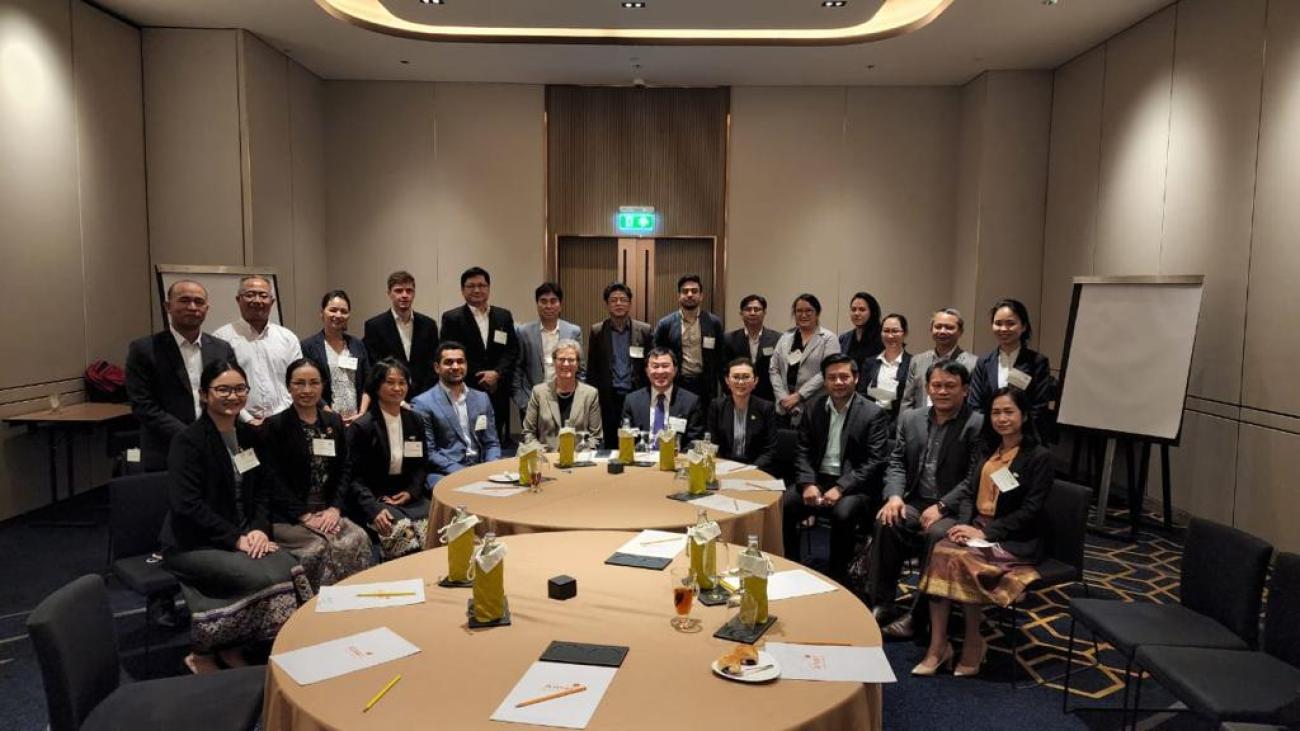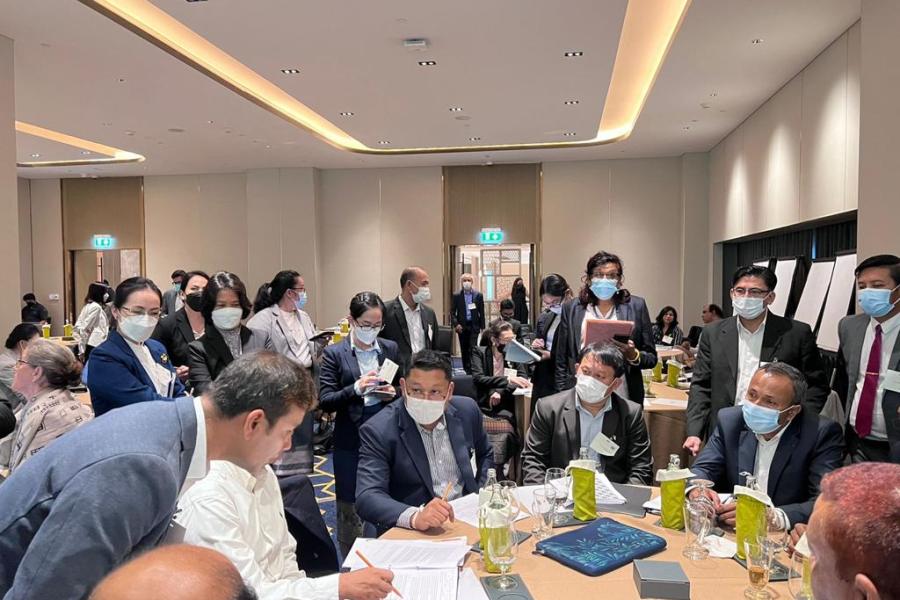Lao PDR, Bangladesh and Nepal successfully conclude the South-South Exchange on Preparing Smooth Transition Strategies: Graduating cohort of 2021

Group meeting at the side of the event
Bangkok, 25 August 2022: From 23 to 25 August, more than ninety Government officials and representatives from private sector, academia, research institutes and civil society from Lao PDR, Bangladesh and Nepal met in Bangkok, Thailand, joined by the United Nations and external experts, to discuss and exchange views on challenges, opportunities, and preparations for graduation from Least Developed Country (LDC) status as the three countries recommended for graduation in 2021.
Organised by the United Nations Department of Economic and Social Affairs (UN DESA) through its Sustainable Graduation Support Facility in partnership with the Committee for Development Policy (CDP), the United Nations Office of the High Representative for the Least Developed Countries, Landlocked Developing Countries and Small Island Developing States (OHRLLS), and Offices of the UN Resident Coordinator from the three countries, the South-South Exchange on Preparing Smooth Transition Strategies (STS) for LDC Graduation is part of the on-going support by the UN Development System to facilitate a smooth transition, sustainable and irreversible graduation.
Addressing the Opening session, Ms. Rabab Fatima, Under Secretary General and High Representative for the Least Developed Countries, Landlocked Developing Countries and Small Island Developing States noted the importance of this enhanced support given the challenging context faced by all countries. She said,
“The compounded impact of multiple crises – such as COVID-19, growing food and commodity prices and the climate emergency – put development progress in the Least Developed Countries at risk. We are coming together to provide a better coordinated United Nations support. Our aim is to lessen the burden on each government’s capacity and catalyse sustainable progress”.
Underlining the importance of more effective support, Mr. Roland Mollerus, CDP Secretary and Chief Development Policy Branch, UNDESA highlighted the importance of this first country-led South-South exchange on preparing for smooth transition, bringing the three graduating countries together “thanks to the key coordination role of the three RCOs in collaboration with DESA, ESCAP and OHRLLS”. On the same note, Ms. Sara Sekkenes, the UN Resident Coordinator in Lao PDR emphasized that
“the South-South Exchange is a truly collaborative effort that allows us to exchange views and capture the broad perspective offered from the delegations on graduation related challenges, options, and recommendations on how to overcome them in their respective country contexts” and added that: “I hope that the interactive deliberations at the Exchange can encourage and stimulate further discussion on the STS at country-level and I look forward to seeing the three Smooth transition Strategies published recognizing many of the elements discussed here today”.
Mr. Daovy Vongxay, Head of the Lao delegation, Director-General of the Department of International Organisations, Ministry of Foreign Affairs of Lao PDR said
“Graduating from LDC has been an ambitious development goal of the Government of Lao PDR for more than two decades. The 2021 Triennial Review by the CDP was indeed an important milestone for the Lao PDR being recommended for graduation in 2026. The important next step is to safeguard these hard-gained achievements and continue this development momentum towards a smooth and sustainable graduation pathway ahead”.
Leading the Lao Delegation Mr. Daovy highlighted the common need of Lao PDR, Bangladesh and Nepal for consistent and coherent support from the UN Development System and development partners in line with the recently adopted Doha Programme of Action. He said:
“We should be mindful that graduation from LDC status is not an end goal, but an important milestone in the countries’ development trajectory. Continued and consistent support from the UN system and development partners must be ensured so that the graduating country do not slip back after graduation”.
Over the course of three days, the Lao delegation, together with Bangladesh and Nepal, had a frank exchange of views and mutual learning on a broad range of topics in the LDC graduation context, including on trade, inclusive and human development and ensure climate action. The Exchange also offered opportunities for the three countries to hold in-depth discussions with the experts from the UN Development System, multilateral organisations, and peer countries from the region including the Republic of Korea and Vietnam --two countries that demonstrate successful development pathways, to better understand how to develop and what actions to promote in the STSs to ensure a sustainable and irreversible LDC graduation.
Key takeaway and priorities for the STS

The Exchange highlighted the need to formulate an inclusive, country-driven, country-tailored, focused STS that responds to national development needs and priorities. The ongoing impact of COVID-19 and the more recent global crisis on fuel, food, fertilisers and finance has underlined the importance of a practical, flexible, and adaptable STS that offers an inclusive platform to discuss and identify concrete steps to ensure greater policy coherence, also as the situation changes over time.
Participants emphasised safeguarding investment in human capital as a precondition for the sustainability of graduation. Even amid severely constrained fiscal space, investment needs in social sectors, particularly in health and education, and the expansion of a resilient social protection scheme to ensure high-quality human resources as the labour force expands were considered a key driver for sustainable and inclusive economic growth. To that end, ongoing efforts to mobilise and align public and private finance for the implementation of national development priorities, were noted be all three countries.
On trade-related issues, the importance of coordination across line ministries and enhancing the engagement of the private sector in the graduation process, was also underscored.
Participants discussed approaches to mainstreaming climate action and environmental protection, including through disaster risk reduction, into the STS to ensure the flow of green, sustainable, and high-quality foreign direct investments. The Lao Government clearly flagged needs for more technical and financial assistance to facilitate access to climate financing to accelerate the transition to climate-resilient development.
Drawing from the rich discussions on common challenges and opportunities through-out the Exchange, the Lao delegation suggested the three countries strengthen their collaborative advocacy efforts committing to using the momentum of graduation to lead policies and strategies for accelerated development progress and leaving no one behind.

